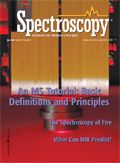Review of the 55th Annual ASMS Conference
The 55th ASMS Conference on Mass Spectrometry was held from June 3-7 this year within the confines of the Indiana Convention Center in Indianapolis, Indiana. Thousands of scientists were in attendance with nearly 3000 papers presented as posters and talks.

The 55th ASMS Conference on Mass Spectrometry was held from June 3–7 this year within the confines of the Indiana Convention Center in Indianapolis, Indiana. Thousands of scientists were in attendance with nearly 3000 papers presented as posters and talks.
On June 2–3, just before the main conference started, a series of short courses were delivered on a variety of topics from the field of mass spectrometry (MS). Included in the two-day courses were Drug Discovery Using Mass Spectrometry: From Target Identification to IND Enabling Studies; FTMS: Principles and Applications; Interpretation of Mass Spectra; LC/MS: The Techniques of Electrospray, APCI, and APPI; LC/MS Technology: Fundamentals and Applications of High Resolution/Accurate Mass in Pharmaceutical Analysis; LC/MS: Practical Aspects; MALDI-TOF/MS: Fundamentals and Applications; Introduction to MS/MS; Mass Spectrometry of Peptides and Proteins; Quadrupole Ion Trap Mass Spectrometry; and Quantitative Mass Spectrometry. Two one-day courses included Introduction to Mass Spectrometry and Metabolomics.
The conference kicked off on June 3 with two tutorial lectures: Why You Can't Patent Ions (Or Can You?), by Michael R. Asam, from Fish & Richardson Attorneys at Law, and Turning Mass Spectrometers into Chemical Reactors: Taking Full Advantage of Ion Chemistry, by Scott Gronert of Virginia Commonwealth University (Richmond, Virginia).
The main area of concentration for the oral sesssions was once again the biomedical field. Sessions on this topic covered drug metabolites, peptides and proteins as biomarkers, biopolymer dynamics, MS evaluations of biomarkers, and increasing MS throughput in pharmaceutical bioanalysis. In addition, the majority of poster sessions dealt with the area of proteomics.
Other areas covered in the oral sessions included characterizing environmental contaminants, ion mobility instrumentation, oxidized proteins, ESI of small molecules, portable MS instruments, the role of MS in homeland security, metal ion activated dissociation, and ambient ionization MS.
Plenary lectures delivered at the conference included Lessons from the Dover Trial: Science, Culture, and the Law, by Eugenie C. Scott, executive director of the National Center for Science Education, Inc. The closing plenary lecture, titled Regulation of Sorting and Processing of the Alzheimer's Amyloid-Beta Precursor Protein, was delivered by Samuel Gandy, Director, Farber Institute for Neurosciences at Thomas Jefferson University (Philadelphia, Pennsylvania).
Hospitality suites sponsored by exhibitors were located at the Marriott and Westin hotels in the city. These suites were set up as a way for conferees to relax after a day of attending the conference while being able to see additional displays of products and services offered by various companies.
Next year, the 56th Annual ASMS Conference will be held June 1–5 in Denver, Colorado. For more information, contact ASMS at:
2019 Galisteo St., Building I-1
Santa Fe, NM 87505
Tel: (505) 989-4517
Fax: (505) 989-1073
E-mail: office@asms.org

Best of the Week: AI and IoT for Pollution Monitoring, High Speed Laser MS
April 25th 2025Top articles published this week include a preview of our upcoming content series for National Space Day, a news story about air quality monitoring, and an announcement from Metrohm about their new Midwest office.
LIBS Illuminates the Hidden Health Risks of Indoor Welding and Soldering
April 23rd 2025A new dual-spectroscopy approach reveals real-time pollution threats in indoor workspaces. Chinese researchers have pioneered the use of laser-induced breakdown spectroscopy (LIBS) and aerosol mass spectrometry to uncover and monitor harmful heavy metal and dust emissions from soldering and welding in real-time. These complementary tools offer a fast, accurate means to evaluate air quality threats in industrial and indoor environments—where people spend most of their time.